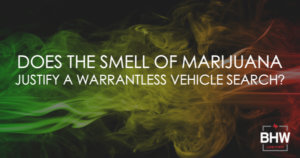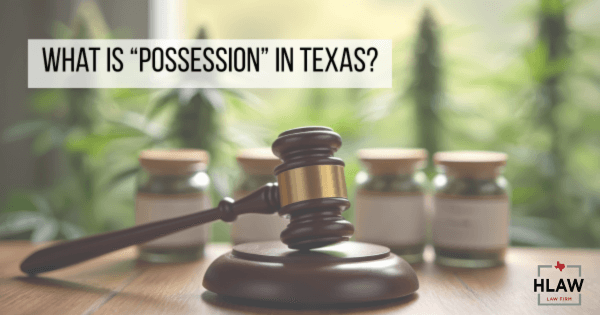Does the Smell of Marijuana Allow Officers to Search My Vehicle Without a Warrant?
 In Texas, the answer is yes. The possession of marijuana is a crime in Texas, so if an officer smells marijuana emanating from your car, he has probable cause to believe a crime is being committed. With probable cause, the law permits the officer to stop and search your car— regardless of whether you consent.
In Texas, the answer is yes. The possession of marijuana is a crime in Texas, so if an officer smells marijuana emanating from your car, he has probable cause to believe a crime is being committed. With probable cause, the law permits the officer to stop and search your car— regardless of whether you consent.
The officer has the ability to do this through what is called the “automobile exception” to the 4th Amendment’s warrant requirement.1 Generally, the 4th Amendment to the United States Constitution requires police officers to first obtain a warrant before they can search a person’s property. However, because automobiles can quickly move locations and evade law enforcement, the Supreme Court reasoned that it would be impractical to require officers to first secure a warrant before they are permitted to search a vehicle.2 So by claiming to smell marijuana, law enforcement officers can also claim to have probable cause to believe a crime is being committed—allowing them to take advantage of the automobile exception and search a vehicle without anything more.
Will the Search Laws Change if Marijuana Becomes Legal?
Maybe. There have been small changes in the law with the current trends in marijuana legalization. A couple of state courts adopted the rule that, after legalization or decriminalization, the smell of marijuana is no longer enough on its own to justify a warrantless search of a vehicle. For example, in Vermont, after the decriminalization of adult possession of less than one ounce of marijuana, the Vermont Supreme Court held that the odor of marijuana alone is insufficient to establish probable cause to search a vehicle.3 The Massachusetts Supreme Court ruled that the state’s decriminalization policy means that the possession of marijuana is now a civil infraction, making the smell of it an insufficient basis for officers to believe a crime is being committed.
However, most states where marijuana is legalized or decriminalized still follow the rule that the smell of it establishes probable cause in support of a vehicle search.4 This is because these states still criminalize the possession of larger amounts of marijuana—meaning that the smell of it still indicates that a crime could be underway. This is the logic that the Washington, Maryland, Colorado, and Arizona courts follow.5
But what about Texas?
As stated above, the possession of marijuana in Texas is a crime, and officers are still justified in searching vehicles if they smell marijuana coming from them. However, Texas legalized the cultivation of industrial hemp in 2019, which smells like just like marijuana. The issue of whether probable cause can still be supported by the odor of marijuana in light of hemp’s legalization was raised in state court in 2020, but the court left it undecided as the vehicle search in question occurred before the legalization of hemp.6 It remains to be seen if or when Texas will legalize marijuana, and what attitude Texas courts will take towards the question of marijuana odor and vehicle searches.
[1] Carroll v. United States, 267 U.S. 132 (1925).
[2] Id., at 153.
[3] Zullo v. State, 2019 Vt. LEXIS 1, * (Vt. January 4, 2019).
[4] Cece white, The Sativas and Indicas of Proof: Why the Smell of Marijuana Should Not Establish Probable Cause for a Warrantless Vehicle Search in Illinois, 53 UIC J. Marshall L. Rev. 187, 211 (2020).
[5] Id., at 211.
[6] Geberkidan v. State, 2020 WL 5406243, NO. 12-19-00296-CR (2020).










